Who Decides the Fate of Baby Charlie Gard? : A Well Thought Out Scream by James Riordan
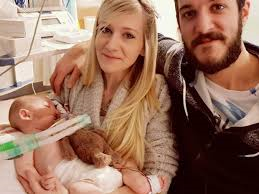
Lots of uproar in the media over poor baby Charlie Gard. And now it’s coming down to who decides if he continues to live — his parents? The hospital in Britain where he is being treated? Or the courts which are trying to settle the matter? Charlie was born on August 4, 2016. That September he was diagnosed with a rare genetic condition called mitochondrial depletion syndrome, which causes progressive muscle weakness and brain damage. He cannot move his limbs or eat or breathe without assistance. His parents, Chris Gard and Connie Yates, are both carriers of the faulty gene, but were unaware of it until Charlie turned three months old. According to a fundraising page they set up, Charlie is only the sixteenth known person in the world with the condition. An American doctor is seeking the right to take Charlie to the United States to try an experimental treatment that has only recently emerged. The doctor, whose name and institution cannot be named because of a court order, told Britain’s High Court that new clinical data has emerged about the effectiveness of the treatment. Charlie’s doctors at London’s Great Ormond Street Hospital for Children, or GOSH, which is Britain’s most famous children’s hospital, believe there is no cure for his condition, which is terminal. The boy’s family is locked in a legal battle with because they disagree on whether trying the experimental treatment is in Charlie’s best interest. The case attracted international attention after President Donald Trump and Pope Francis weighed in.
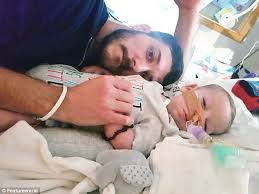 Because Charlie’s parents disagreed with the doctors’ decision about Charlie’s future treatment, the decision went to the Family Division of Britain’s High Court in London. The European Court of Human Rights last month rejected an appeal from his parents to take him to the US for experimental treatment. The High Court ruled last April “with the heaviest of hearts” that it was in Charlie’s best interests for GOSH to “lawfully withdraw all treatment save for palliative care to permit Charlie to die with dignity.”
Because Charlie’s parents disagreed with the doctors’ decision about Charlie’s future treatment, the decision went to the Family Division of Britain’s High Court in London. The European Court of Human Rights last month rejected an appeal from his parents to take him to the US for experimental treatment. The High Court ruled last April “with the heaviest of hearts” that it was in Charlie’s best interests for GOSH to “lawfully withdraw all treatment save for palliative care to permit Charlie to die with dignity.”
The judge said his decision not to allow Charlie to go to the U.S. was not related to funding. “I dare say that medical science may benefit objectively from the experiment, but experimentation cannot be in Charlie’s best interests unless there is a prospect of benefit for him,” he said, referring to the trial treatment, The Guardian reported at the time.
The new hearing has been called by the hospital in the light of “claims of new evidence relating to potential treatment” for the baby. Doctors at Great Ormond Street say it would be kinder to stop his life support. Katie Gollop QC, representing the hospital, called the doctor’s findings “all very theoretical”, saying: “You’re trying to translate one experiment to another.”
Questions were raised during the hearing over whether the baby feels pain and the extent of his brain damage, which if severe would likely impede the proposed treatment from working. The specialist, who is proposing to give nucleoside therapy to the 11-month-old, told the High Court via video link his research “clearly indicates” the experimental therapy reduces muscle weakness in patients with a similar genetic disorder. He said the chance of the treatment’s “clinically meaningful success” was about 10 per cent, based on the findings of a study involving nine patients on life support, of whom one no longer needed a ventilator. “We have a much better understanding of the data,” the doctor testified, saying the information has emerged in the time since judges first rejected the parents’ bid to take him to America.
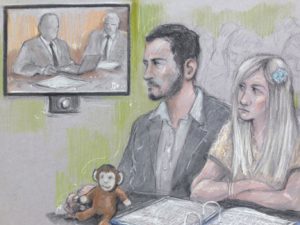 Charlie’s parents believe the experimental medication may be able to help the child, who is on life support. “After endlessly researching and speaking to [doctors] all over the world we found hope in a medication that may help him and a [doctor] in America has accepted him in his hospital,” wrote the parents on Charlie’s fundraising page. “It hasn’t been tried on anyone with his gene before . . . but it’s had success with another mitochondrial depletion syndrome called TK2 which is similar.”
Charlie’s parents believe the experimental medication may be able to help the child, who is on life support. “After endlessly researching and speaking to [doctors] all over the world we found hope in a medication that may help him and a [doctor] in America has accepted him in his hospital,” wrote the parents on Charlie’s fundraising page. “It hasn’t been tried on anyone with his gene before . . . but it’s had success with another mitochondrial depletion syndrome called TK2 which is similar.”
Gard and Yates added that they “strongly feel . . . Charlie should get a chance to try these medications” and he has “literally has nothing to lose but potentially a healthier, happier life to gain.” The pair set up a GoFundMe page to help raise money to send Charlie to the U.S. They raised £1.3 million ($1.68 million) in five months, with donations from 83,563 people.
A statement on the hospital’s website explains that “GOSH explored various treatment options” including nucleoside therapy, the experimental treatment offered by the U.S. hospital. “GOSH concluded that the experimental treatment, which is not designed to be curative, would not improve Charlie’s quality of life,” the statement says. After balancing whether the experimental treatment was in Charlie’s best interests or not, the GOSH doctors said they thought it would be best to stop providing life support for Charlie and instead move on to a palliative care regime, allowing him to “die with dignity.”
 “One of the factors that influenced this decision was that Charlie’s brain was shown to be extensively damaged at a cellular level. The clinician in the U.S. who is offering the treatment agrees that the experimental treatment will not reverse the brain damage that has already occurred,” the statement says. “The entire highly experienced U.K. team, all those who provided second opinions and the consultant instructed by the parents all agreed that further treatment would be futile — meaning it would be pointless or of no effective benefit,” it adds.
“One of the factors that influenced this decision was that Charlie’s brain was shown to be extensively damaged at a cellular level. The clinician in the U.S. who is offering the treatment agrees that the experimental treatment will not reverse the brain damage that has already occurred,” the statement says. “The entire highly experienced U.K. team, all those who provided second opinions and the consultant instructed by the parents all agreed that further treatment would be futile — meaning it would be pointless or of no effective benefit,” it adds.
Specialists at Great Ormond Street Hospital have fought the parent’s bid for therapy because they don’t think it will help and may cause him pain. The hospital says Charlie should be allowed to die with dignity. A succession of courts has backed the hospital, but the case returned to the High Court Thursday after claims of new evidence and the high-profile interventions.
The emotional toll on all involved has been clear. Two hours into the High Court hearing, questions the judge prompted tensions to boil over. Charlie’s mother Connie Yates shouted out, accusing Francis of misquoting her earlier statements about her son’s quality of life. “We said he’s not suffering and not in pain,” she yelled. “If he was we wouldn’t be up here fighting.” Chris Gard then slammed his water cup down and the couple left the courtroom. Sobs were heard from family members as Charlie’s parents stormed out of the courtroom.
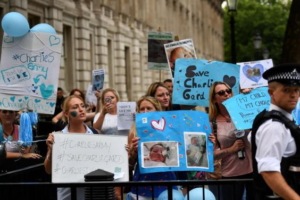 Campaigners wearing blue and white and chanting slogans in support of Chris Gard and Connie Yates gathered outside the court, where the case that has drawn international attention and offers of help from Donald Trump and the Pope is set to resume at 2pm on Friday.
Campaigners wearing blue and white and chanting slogans in support of Chris Gard and Connie Yates gathered outside the court, where the case that has drawn international attention and offers of help from Donald Trump and the Pope is set to resume at 2pm on Friday.
The couple returned after a break. The judge offered a reassuring word, acknowledging that the situation was desperate.
“I understand you walking out,” he said.
Earlier, Donald rump gave the parents new hope by offering help in a tweet, while the Pope has insisted on the need to respect the wishes of the parents to “accompany and treat” their son to the very end.
Americans United for Life and other groups have seized upon the case, arguing the infant needs a “chance at life.” Petitions have circulated to offer support and others have arrived at Charlie’s bedside to pray.
“We are continuing to spend every moment, working around the clock to save our dear baby Charlie,” the couple said in a statement before the hearing. “We’ve been requesting this specialized treatment since November, and never asked the hospital, courts or anyone for anything — except for the permission to go.”
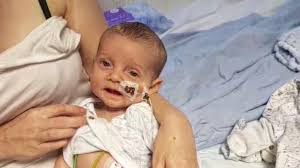 British judges are tasked to intervene when families and doctors disagree on the care of people unable to speak for themselves. The rights of the child take primacy, with the courts weighing issues such as whether a child is suffering and how much benefit a proposed treatment might produce.
British judges are tasked to intervene when families and doctors disagree on the care of people unable to speak for themselves. The rights of the child take primacy, with the courts weighing issues such as whether a child is suffering and how much benefit a proposed treatment might produce.
“Unlike the U.S.A., English law is focused on the protection of children’s rights,” said Jonathan Montgomery, professor of health care law at University College London. “The U.S.A. is the only country in the world that is not party to the U.N. Convention on the Rights of the Child; it does not recognize that children have rights independent of their parents.”
Montgomery said that while it was right to consider the views of Charlie’s parents, the court will not make a determination on this basis.
“This case is about Charlie’s rights and what the evidence tells us that they require,” he said. “That will be the only consideration of the judge at the hearing.”
Francis, the judge who ruled in favor of doctors in April, has said he will consider any new evidence. The courtroom was packed as he heard arguments on differences of medical opinion.
The hospital, meanwhile, offered an unapologetic defense of its decision in a submission to the High Court. The hospital’s attorney, Katie Gollop, wrote that while the institution understands that Charlie’s parents believe they alone have the right to decide the treatment for their son, the hospital is bound by different principles.
“A world where only parents speak and decide for children and where children have no separate identity or rights and no court to hear and protect them is far from the world in which GOSH treats its child patients,” the hospital said.
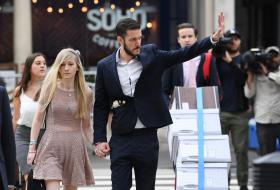 Does protecting a child rights include his right to “die with dignity?” How much dignity does a ten month old baby have in the first place? I know of a few instances in which a child was born with such serious birth defects that doctors thought he or she should be “unplugged”, but the parent refused and the child later miraculously recovered. Yes, we’re talking probable supernatural interference, a miracle answer to prayer. The point is the doctors, the hospitals and the courts were ruling out the possibility for such a thing, but the parents fought it. At least these parents and Charlie’s parents are able to fight for that chance. In the future, such things may well be decided without the parents having that option. Or maybe even knowing there was such an option. Who has the right to make this kind of decision? If this choice is taken from the family and given to big corporations for, in the end, that’s what most hospitals are, than we have taken another drastic step toward Huxley’s Brave New World, Orwell’s 1984, Atwood’s A Handmaid’s Tale and Phillip K. Dick’s Blade Runner. Are you ready to go there?
Does protecting a child rights include his right to “die with dignity?” How much dignity does a ten month old baby have in the first place? I know of a few instances in which a child was born with such serious birth defects that doctors thought he or she should be “unplugged”, but the parent refused and the child later miraculously recovered. Yes, we’re talking probable supernatural interference, a miracle answer to prayer. The point is the doctors, the hospitals and the courts were ruling out the possibility for such a thing, but the parents fought it. At least these parents and Charlie’s parents are able to fight for that chance. In the future, such things may well be decided without the parents having that option. Or maybe even knowing there was such an option. Who has the right to make this kind of decision? If this choice is taken from the family and given to big corporations for, in the end, that’s what most hospitals are, than we have taken another drastic step toward Huxley’s Brave New World, Orwell’s 1984, Atwood’s A Handmaid’s Tale and Phillip K. Dick’s Blade Runner. Are you ready to go there?
___




No Comment